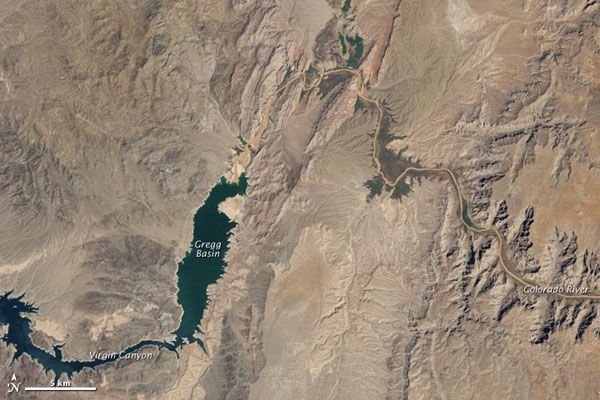Should the US 'Cap-and-Trade' Our Water Sources?

Every year, users of the Lake Mead reservoir are consuming more water than flows into the lake from its source, the Colorado River. Lake Mead is the largest water reservoir in the United States, but this water consumption threatens the water supply for agriculture and households.
To solve this imbalance scientists are proposing a cap and trade system of interstate water trading. The proposal was published May 4 in Journal of the American Water Resources Association.
The paper suggests "a cap and trade system such as that being applied to carbon dioxide emissions," study researcher Rich Wildman, of Quest University in Canada, said in a statement. Before his graduate student suggested the idea, Wildman said he "had never heard of anything like this proposed for the Colorado River Basin, so I suggested we write a paper to share it with a broader audience."
The proposal paper analyzes current policy regarding the management of the Colorado River Basin and explores the viability of interstate water trading as a way to add flexibility into the system during times of water shortage.
The Colorado River basin is forecasted to undergo increasing droughts in the future, due to climate change. These "initial shortages will be borne only by the cities of Arizona and Nevada and farms in Arizona whereas the other Basin states have no incentive to reduce consumptive use," the researchers write.
The U.S. Bureau of Reclamation is currently seeking to present policymakers with options for restoring the Colorado's imbalance. Wildman's paper has been published in response to the Bureau's solicitation for comments and ideas from the public for how to solve the problem.
Currently, Australia has a successful interstate water trading system, which the researchers used to demonstrate the concept's viability for the U.S. The paper explores what features of the Colorado River Basin law and culture might act as barriers to creating a system similar to that in Australia.
Sign up for the Live Science daily newsletter now
Get the world’s most fascinating discoveries delivered straight to your inbox.
This Australian system "has used interstate water trading to create vital flexibility during extreme aridity during recent years," the researchers write. "We find that, despite substantial obstacles, an interstate water market is a compelling reform that could be used not only to adapt to increased water scarcity but also to preserve core elements of Colorado River Basin law."











